Henry Gouk
TAU, LISN
The Reward Model Selection Crisis in Personalized Alignment
Dec 28, 2025Abstract:Personalized alignment from preference data has focused primarily on improving reward model (RM) accuracy, with the implicit assumption that better preference ranking translates to better personalized behavior. However, in deployment, computational constraints necessitate inference-time adaptation via reward-guided decoding (RGD) rather than per-user policy fine-tuning. This creates a critical but overlooked requirement: reward models must not only rank preferences accurately but also effectively guide token-level generation decisions. We demonstrate that standard RM accuracy fails catastrophically as a selection criterion for deployment-ready personalized alignment. Through systematic evaluation across three datasets, we introduce policy accuracy, a metric quantifying whether RGD scoring functions correctly discriminate between preferred and dispreferred responses. We show that RM accuracy correlates only weakly with this policy-level discrimination ability (Kendall's tau = 0.08--0.31). More critically, we introduce Pref-LaMP, the first personalized alignment benchmark with ground-truth user completions, enabling direct behavioral evaluation without circular reward-based metrics. On Pref-LaMP, we expose a complete decoupling between discrimination and generation: methods with 20-point RM accuracy differences produce almost identical output quality, and even methods achieving high discrimination fail to generate behaviorally aligned responses. Finally, simple in-context learning (ICL) dominates all reward-guided methods for models > 3B parameters, achieving 3-5 point ROUGE-1 gains over the best reward method at 7B scale. These findings show that the field optimizes proxy metrics that fail to predict deployment performance and do not translate preferences into real behavioral adaptation under deployment constraints.
Model Merging is Secretly Certifiable: Non-Vacuous Generalisation Bounds for Low-Shot Learning
May 21, 2025Abstract:Certifying the IID generalisation ability of deep networks is the first of many requirements for trusting AI in high-stakes applications from medicine to security. However, when instantiating generalisation bounds for deep networks it remains challenging to obtain non-vacuous guarantees, especially when applying contemporary large models on the small scale data prevalent in such high-stakes fields. In this paper, we draw a novel connection between a family of learning methods based on model fusion and generalisation certificates, and surprisingly show that with minor adjustment several existing learning strategies already provide non-trivial generalisation guarantees. Essentially, by focusing on data-driven learning of downstream tasks by fusion rather than fine-tuning, the certified generalisation gap becomes tiny and independent of the base network size, facilitating its certification. Our results show for the first time non-trivial generalisation guarantees for learning with as low as 100 examples, while using vision models such as VIT-B and language models such as mistral-7B. This observation is significant as it has immediate implications for facilitating the certification of existing systems as trustworthy, and opens up new directions for research at the intersection of practice and theory.
Model Diffusion for Certifiable Few-shot Transfer Learning
Feb 10, 2025Abstract:In modern large-scale deep learning, a prevalent and effective workflow for solving low-data problems is adapting powerful pre-trained foundation models (FMs) to new tasks via parameter-efficient fine-tuning (PEFT). However, while empirically effective, the resulting solutions lack generalisation guarantees to certify their accuracy - which may be required for ethical or legal reasons prior to deployment in high-importance applications. In this paper we develop a novel transfer learning approach that is designed to facilitate non-vacuous learning theoretic generalisation guarantees for downstream tasks, even in the low-shot regime. Specifically, we first use upstream tasks to train a distribution over PEFT parameters. We then learn the downstream task by a sample-and-evaluate procedure -- sampling plausible PEFTs from the trained diffusion model and selecting the one with the highest likelihood on the downstream data. Crucially, this confines our model hypothesis to a finite set of PEFT samples. In contrast to learning in the typical continuous hypothesis spaces of neural network weights, this facilitates tighter risk certificates. We instantiate our bound and show non-trivial generalization guarantees compared to existing learning approaches which lead to vacuous bounds in the low-shot regime.
Strategic Classification with Randomised Classifiers
Feb 03, 2025Abstract:We consider the problem of strategic classification, where a learner must build a model to classify agents based on features that have been strategically modified. Previous work in this area has concentrated on the case when the learner is restricted to deterministic classifiers. In contrast, we perform a theoretical analysis of an extension to this setting that allows the learner to produce a randomised classifier. We show that, under certain conditions, the optimal randomised classifier can achieve better accuracy than the optimal deterministic classifier, but under no conditions can it be worse. When a finite set of training data is available, we show that the excess risk of Strategic Empirical Risk Minimisation over the class of randomised classifiers is bounded in a similar manner as the deterministic case. In both the deterministic and randomised cases, the risk of the classifier produced by the learner converges to that of the corresponding optimal classifier as the volume of available training data grows. Moreover, this convergence happens at the same rate as in the i.i.d. case. Our findings are compared with previous theoretical work analysing the problem of strategic classification. We conclude that randomisation has the potential to alleviate some issues that could be faced in practice without introducing any substantial downsides.
Is Scaling Learned Optimizers Worth It? Evaluating The Value of VeLO's 4000 TPU Months
Oct 27, 2023Abstract:We analyze VeLO (versatile learned optimizer), the largest scale attempt to train a general purpose "foundational" optimizer to date. VeLO was trained on thousands of machine learning tasks using over 4000 TPU months with the goal of producing an optimizer capable of generalizing to new problems while being hyperparameter free, and outperforming industry standards such as Adam. We independently evaluate VeLO on the MLCommons optimizer benchmark suite. We find that, contrary to initial claims: (1) VeLO has a critical hyperparameter that needs problem-specific tuning, (2) VeLO does not necessarily outperform competitors in quality of solution found, and (3) VeLO is not faster than competing optimizers at reducing the training loss. These observations call into question VeLO's generality and the value of the investment in training it.
Evaluating the Evaluators: Are Current Few-Shot Learning Benchmarks Fit for Purpose?
Jul 06, 2023
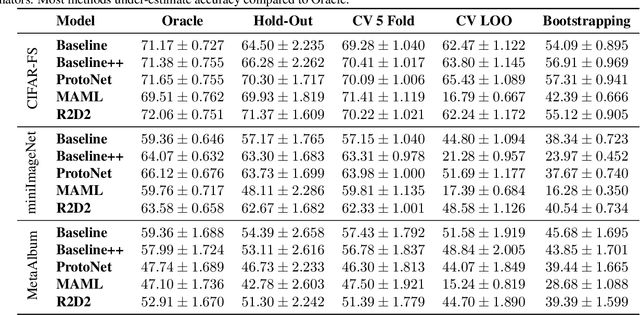
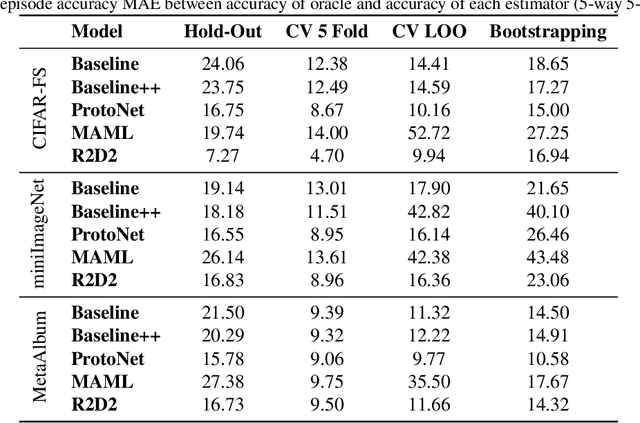
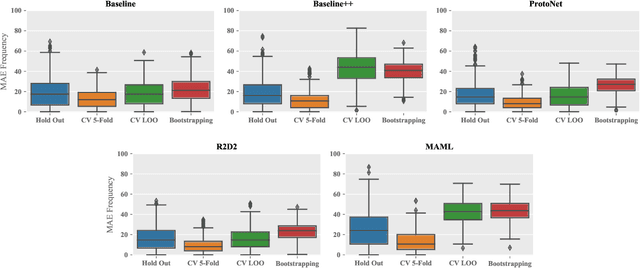
Abstract:Numerous benchmarks for Few-Shot Learning have been proposed in the last decade. However all of these benchmarks focus on performance averaged over many tasks, and the question of how to reliably evaluate and tune models trained for individual tasks in this regime has not been addressed. This paper presents the first investigation into task-level evaluation -- a fundamental step when deploying a model. We measure the accuracy of performance estimators in the few-shot setting, consider strategies for model selection, and examine the reasons for the failure of evaluators usually thought of as being robust. We conclude that cross-validation with a low number of folds is the best choice for directly estimating the performance of a model, whereas using bootstrapping or cross validation with a large number of folds is better for model selection purposes. Overall, we find that existing benchmarks for few-shot learning are not designed in such a way that one can get a reliable picture of how effectively methods can be used on individual tasks.
Meta Omnium: A Benchmark for General-Purpose Learning-to-Learn
May 12, 2023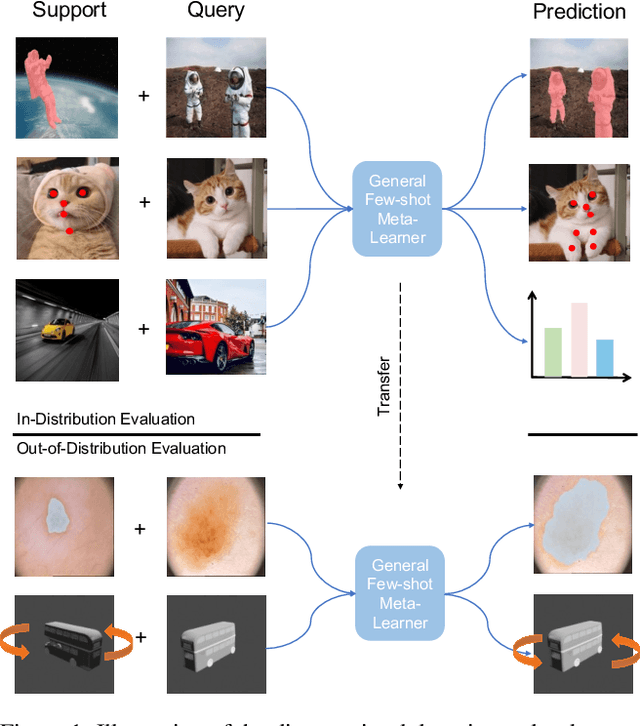

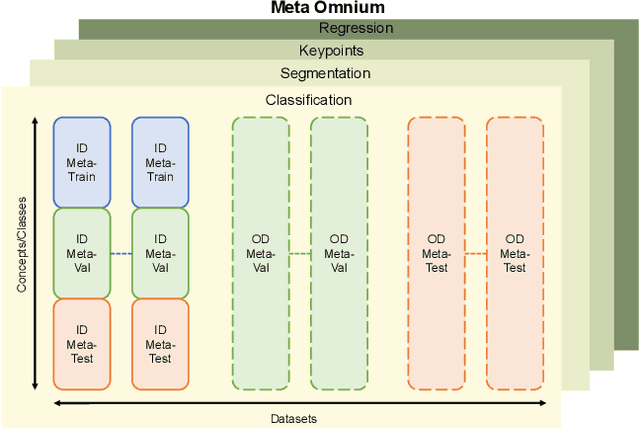
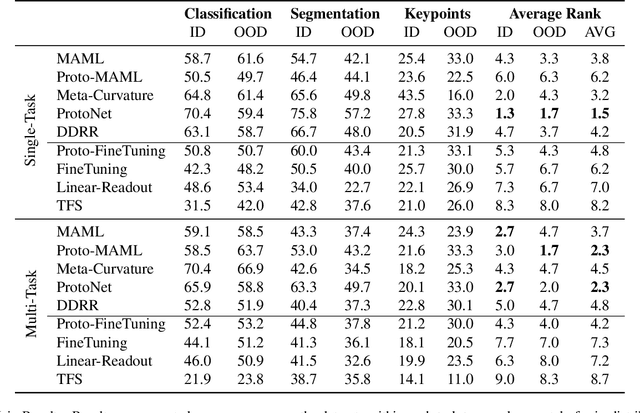
Abstract:Meta-learning and other approaches to few-shot learning are widely studied for image recognition, and are increasingly applied to other vision tasks such as pose estimation and dense prediction. This naturally raises the question of whether there is any few-shot meta-learning algorithm capable of generalizing across these diverse task types? To support the community in answering this question, we introduce Meta Omnium, a dataset-of-datasets spanning multiple vision tasks including recognition, keypoint localization, semantic segmentation and regression. We experiment with popular few-shot meta-learning baselines and analyze their ability to generalize across tasks and to transfer knowledge between them. Meta Omnium enables meta-learning researchers to evaluate model generalization to a much wider array of tasks than previously possible, and provides a single framework for evaluating meta-learners across a wide suite of vision applications in a consistent manner.
Effectiveness of Debiasing Techniques: An Indigenous Qualitative Analysis
Apr 17, 2023Abstract:An indigenous perspective on the effectiveness of debiasing techniques for pre-trained language models (PLMs) is presented in this paper. The current techniques used to measure and debias PLMs are skewed towards the US racial biases and rely on pre-defined bias attributes (e.g. "black" vs "white"). Some require large datasets and further pre-training. Such techniques are not designed to capture the underrepresented indigenous populations in other countries, such as M\=aori in New Zealand. Local knowledge and understanding must be incorporated to ensure unbiased algorithms, especially when addressing a resource-restricted society.
* accepted with invite to present
Amortised Invariance Learning for Contrastive Self-Supervision
Feb 24, 2023



Abstract:Contrastive self-supervised learning methods famously produce high quality transferable representations by learning invariances to different data augmentations. Invariances established during pre-training can be interpreted as strong inductive biases. However these may or may not be helpful, depending on if they match the invariance requirements of downstream tasks or not. This has led to several attempts to learn task-specific invariances during pre-training, however, these methods are highly compute intensive and tedious to train. We introduce the notion of amortised invariance learning for contrastive self supervision. In the pre-training stage, we parameterize the feature extractor by differentiable invariance hyper-parameters that control the invariances encoded by the representation. Then, for any downstream task, both linear readout and task-specific invariance requirements can be efficiently and effectively learned by gradient-descent. We evaluate the notion of amortised invariances for contrastive learning over two different modalities: vision and audio, on two widely-used contrastive learning methods in vision: SimCLR and MoCo-v2 with popular architectures like ResNets and Vision Transformers, and SimCLR with ResNet-18 for audio. We show that our amortised features provide a reliable way to learn diverse downstream tasks with different invariance requirements, while using a single feature and avoiding task-specific pre-training. This provides an exciting perspective that opens up new horizons in the field of general purpose representation learning.
Attacking Adversarial Defences by Smoothing the Loss Landscape
Aug 05, 2022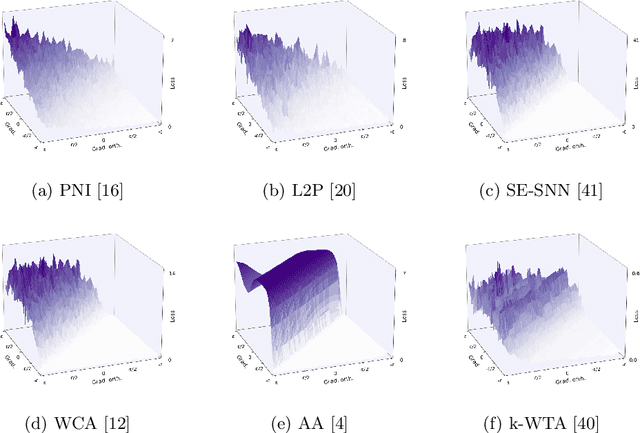



Abstract:This paper investigates a family of methods for defending against adversarial attacks that owe part of their success to creating a noisy, discontinuous, or otherwise rugged loss landscape that adversaries find difficult to navigate. A common, but not universal, way to achieve this effect is via the use of stochastic neural networks. We show that this is a form of gradient obfuscation, and propose a general extension to gradient-based adversaries based on the Weierstrass transform, which smooths the surface of the loss function and provides more reliable gradient estimates. We further show that the same principle can strengthen gradient-free adversaries. We demonstrate the efficacy of our loss-smoothing method against both stochastic and non-stochastic adversarial defences that exhibit robustness due to this type of obfuscation. Furthermore, we provide analysis of how it interacts with Expectation over Transformation; a popular gradient-sampling method currently used to attack stochastic defences.
 Add to Chrome
Add to Chrome Add to Firefox
Add to Firefox Add to Edge
Add to Edge